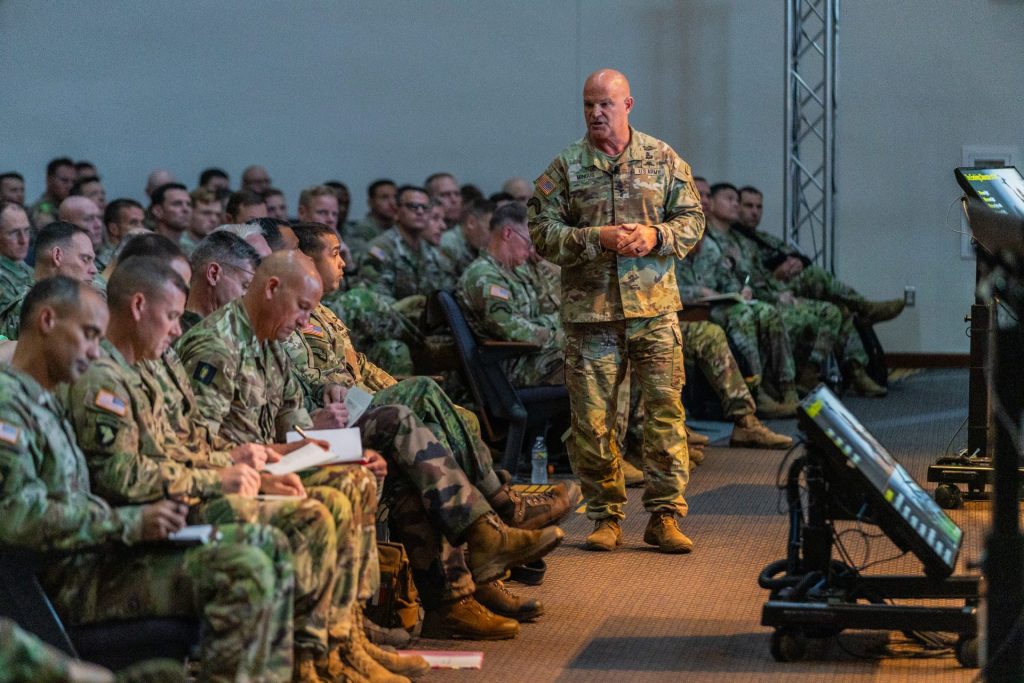President Trump’s Nomination of Lt. Gen. Christopher LaNeve as Vice Chief of Staff of the Army
On Monday, President Donald Trump made headlines by nominating Lt. Gen. Christopher LaNeve to serve as the next vice chief of staff of the Army, a pivotal role that could shape the future of the military. Alongside this nomination, the President recommended LaNeve for promotion to the grade of general. This appointment could signal a significant shift in the Army’s leadership dynamics.
A Transition of Leadership
If confirmed by the Senate, LaNeve will step into the shoes of Gen. James Mingus, who has held the vice chief of staff position since January 2024. Mingus, known for his innovative approach to military operations and technologies, has been an instrumental figure during his tenure, focusing on warfighting strategies and soldier wellbeing. His potential departure comes amidst a backdrop of rapidly evolving military priorities under the Biden administration.
Context of the Nomination
LaNeve’s nomination emerges shortly after a notable event at Marine Corps Base Quantico, where Defense Secretary Pete Hegseth convened hundreds of U.S. military officials. During this gathering, he indicated a shift in military culture, emphasizing a “less woke” military ethos, which has raised eyebrows and spurred discussion among military circles and political commentators alike. Hegseth’s remarks about expected personnel changes have set the stage for a new era in military leadership.
The Role of Vice Chief of Staff
The role of vice chief of staff of the Army is fluid, lacking a fixed term or limitation. Previous officials in this capacity have navigated varied tenures, reflecting the unique challenges and transformations within the Armed Forces. This post is pivotal, serving as the principal deputy to the Chief of Staff, overseeing critical operations and decision-making processes.
Insights from Pentagon Officials
While the Pentagon has remained tight-lipped regarding the details of LaNeve’s nomination, a spokesperson confirmed that he was selected by the President. Inquiries into the reasoning behind the nomination have not received immediate responses, but the continuity in leadership is emphasized, as Gen. Mingus will continue to manage his responsibilities while the nomination process unfolds.
Gen. Mingus’s Contributions
Gen. Mingus has a robust military background, having commanded at various levels from company to division, providing him with a wealth of experience. His strategic vision has been crucial in advancing the Army Transformation Initiative, focusing on modernizing military practices, procurement, and deployment strategies. He has also played a significant role in Next-Generation Command and Control, addressing the Army’s technological evolution as a top priority.
Lt. Gen. LaNeve’s Background
If confirmed, LaNeve will transition from his current role as a senior military assistant to Hegseth, a position he has held since April. His career path boasts prominent leadership roles, including serving as the commanding general of the Eighth Army in the Republic of Korea and as head of the 82nd Airborne Division. His experience places him in a unique position to steer the Army’s operational and strategic initiatives.
Media Coverage and Implications
The announcement of LaNeve’s nomination gained media traction, with sources such as Breaking Defense first reporting the news. As LaNeve’s nomination process moves forward, it highlights not only the changing faces within Army leadership but also the broader implications for military policy and direction amid evolving political landscapes.
Through this nomination, the Administration’s objectives regarding military culture and operational strategy continue to come into focus, especially as the Army embraces modernization in response to contemporary challenges. As the confirmation process unfolds, many will keenly observe how LaNeve’s vision aligns with current military directives and the ongoing transformation of the U.S. Armed Forces.

